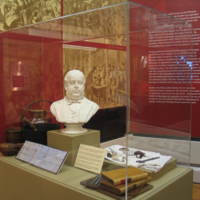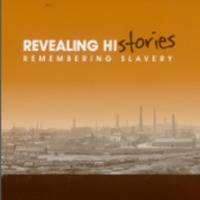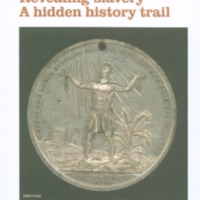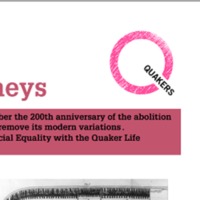
Revealing Histories: Remembering Slavery (Touchstones Rochdale)
Touchstones Rochdale was one of eight heritage bodies in the ‘Revealing Histories: Remembering Slavery’ partnership in Greater Manchester. The project set out to explore the history, impact and legacy of slavery on Britain through collections and community links in the North West.
Rochdale's connections to slavery were explored though two exhibitions at Touchstones Rochdale, which featured museum trails and family events. 'The Fight to End Slavery: A Local Story' examined the town's role in the struggle to end slavery in North America, including the work of prominent abolitionists from Lancashire. The exhibition also looked at the impact of the Lancashire cotton famine, which occurred as a result of the blockade of southern American ports during the Civil War. 'Linking Threads: Textile Industrialists and the Art Collection' focused on works given to the Rochdale Art Gallery collection by benefactors who had links to the local textile industry, such as Robert Taylor Heape and Richard Heape.

Revealing Histories: Remembering Slavery (Gallery Oldham)
Gallery Oldham was one of eight heritage bodies in the ‘Revealing Histories: Remembering Slavery’ partnership in Greater Manchester. The project set out to explore the history, impact and legacy of slavery on Britain through collections and community links in the North West.
A number of objects from Gallery Oldham's collections were identified as having links to the histories of the slave trade and slavery, focused on the themes of sugar, abolition, the American Civil War and the cotton industry. Two exhibitions also played a role in this trail. 'Cops and Bobbins', exploring Oldham's textile industry, illuminated the links with American slavery in the 19th century. 'Oldham Votes' looked at the significance of the election of 1832, during which slavery and abolition were debated. In collaboration with Touchstones Rochdale, Gallery Oldham also hosted a special day event, 'Slavery - what's it got to do with us?', featuring family activities, debate, and performances of African dance.

Revealing Histories: Remembering Slavery (Bolton Museum and Archives)
Bolton Museum and Archives was one of eight heritage bodies in the 'Revealing Histories: Remembering Slavery’ partnership in Greater Manchester. The project set out to explore the history, impact and legacy of slavery on Britain through collections and community links in the North West.
Bolton Museum and Archive Service launched a trail around its galleries to re-interpret objects on display in the context of slavery and its legacies. At the centre of the trail was Samuel Crompton's spinning mule, a machine which helped to revolutionize the British cotton industry. As part of the project, Bolton Council republished and distributed 'The Narrative of the Life of James Watkins', originally published in 1852. Watkins escaped slavery in the southern United States and travelled to Lancashire to become an anti-slavery campaigner. The museum also hosted African folk storytelling sessions, and produced a Key Stage 3 education pack, 'Chains and Cotton: Bolton’s Perspective on the Slave Trade'. A special event day, 'Facing up to the past' featured performances, poetry reading and debate.

Quakers and the path to abolition in Britain and the colonies
The Society of Friends expressed its formal opposition to the slave trade in 1727, and from that date were vocal opponents of transatlantic slavery. A virtual exhibition of archived resources, ‘Quakers and the path to abolition in Britain and the colonies’, was launched online to commemorate the bicentenary. It traced the history of the anti-slavery movement from its Quaker beginnings and highlighted key events in the Quaker history of opposition to the slave trade, and was primarily based on material from the Library at Friends House. The exhibition also explained the important role played by Quaker women abolitionists through writing and poetry. The Quakers pioneered contemporary tactics such as boycotting, petitions, leafleting and poster campaigns.
Other resources to help people find out more about the bicentenary included ‘Abolition Journeys’, developed by Quaker Life Committee for Racial Equality with the Quaker Life Children and Young People’s Staff Team, designed to help people of all ages remember the slave trade and work to abolish its modern variations.

Revealing Histories: Remembering Slavery (Museum of Science and Industry)
The Museum of Science and Industry (MOSI) was one of eight heritage bodies in the ‘Revealing Histories: Remembering Slavery’ partnership in Greater Manchester. The project set out to explore the history, impact and legacy of slavery on Britain through collections and community links in the North West.
An exhibition and trail at MOSI explored the connections between Manchester’s economic success from the late eighteenth century onwards and its international trade, particularly the cotton trade with the USA, with its associated links to the transatlantic slave trade. Items identified in the collection included an American Civil War patriotic envelope from 1861, which satirised Britain's willingness to ignore the plight of American slaves. Other events included the creation of a series of terracotta figures depicting slaves on a slave ship by artist Annette Cobley. Workshop sessions to accompany this artwork were based on the theme of silence surrounding slavery.